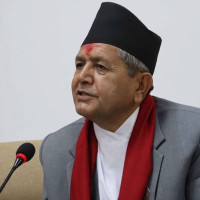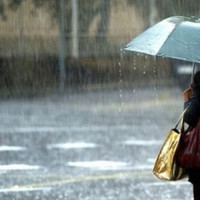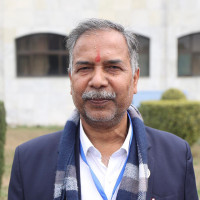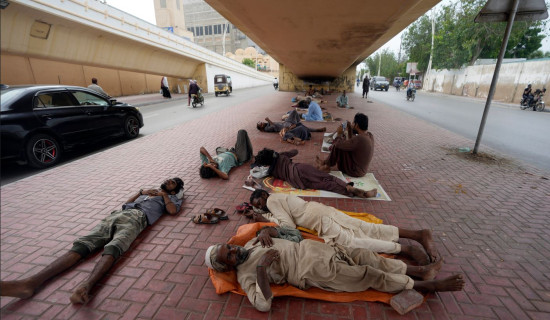- Saturday, 31 May 2025
International level stadiums can work wonders for Nepali cricket
By Pramod Joshi,Kathmandu, Mar. 26: On the 16th of March, an unprecedented event took place in Nepali cricket as thousands of cricket fans flocked to the TU Cricket Ground in Kirtipur to witness their home side's momentous qualification for the ICC Men's ODI World Cup Qualifiers.
The scene was an unforgettable one. Many could not get a seat inside the stadium, but watched their local cricket heroes play nevertheless -- some were up in trees, some on the walls
and buildings outside, and some even on the streets.
What made this scene even more memorable was Nepal's dramatic 9-run win over the UAE through the Durkworth-Lewis-Stern method; it was truly a historic day for Nepal.
World cricket was awestruck by the presence of unprecedented number of Nepali fans cheering their national team, which is not a Test-playing nations like India, Australia, England, South Africa and so on. Pictures and videos of those fans watching the match from such unconventional spots flooded social media platforms, displaying
the passion of Nepali fans for the game of cricket.
The love for cricket is something to behold, and this holds true for Nepal. For the dedicated Nepali cricket fans, cheering from unusual spots during an international match at TU Cricket Ground is nothing out of the ordinary. But for those who are just discovering Nepali cricket, these ardent fans may come across as crazy.
The reality, however, is far more sombre - they simply have no other option due to a lack of fully-facilitated cricket stadiums in Nepal.
'No solid infrastructure'
As put up by the President of the Cricket Association of Nepal, Chatur Bahadur Chand there are only cricket fields in Nepal. "We have some cricket fields and pitches for regular practice. We have only one venue of the ICC standards. We do not even have a proper pavilion and parapet. We do not have a solid infrastructure."
Despite cricket being introduced in the country a century ago by the ruling Rana elites in the 1920s, it took nearly eight decades for Nepal to develop its first international-level pitch.
Initially, cricket was confined to the walls of the ruling aristocrats only. Though the Cricket Association of Nepal (CAN) was established in 1946, the promotion of the game in the whole nation was initiated only after being affiliated with the National Sports Council in 1961. Nepal took a stride in cricket development after being affiliated with International Cricket Council (ICC) in 1988. The affiliation with ICC triggered the inception of domestic tournaments in Nepal.
Nepal became an associate member of the ICC in 1996 and played its first international match in the ACC Trophy in Malaysia the same year. Two years later, Asian Cricket Council (ACC) awarded Nepal the right to host the ACC Trophy in Kathmandu.
Considering the need for a proper cricket pitch to host its first international event, CAN signed an agreement with then Zee Sports to develop a football ground at Tribhuvan University (TU), Kirtipur as a cricket ground.
Taking the ground on lease from the nation's oldest university, the cricket administration developed it into an international-level cricket pitch. Since then, TU Cricket Ground has been hosting major international and national tournaments.
The cricket association also utilised the grounds of schools and colleges to host the ACC Trophy and other age-group ACC tournaments. The grounds of the Institute of Engineering College, Birendra Sainik School, Laboratory School and St. Xavier's School were utilised to play the matches of ACC tournaments that Nepal hosted.
Cricket fervour also surged in the nation after our national side took part in the ICC's global event -Twenty20 World Cup held in Bangladesh in 2014. Nepal gained One Day International status four years later in 2018. Nepal also regained the Twenty20 International status. The extraordinary performance of winning 11 out of 12 matches in three successive trilateral series saw Nepal retain its ODI status and directly secure a berth to World Cup Qualifiers by finishing third in the recently held League-2.
Infrastructural Need
The latest success helped Nepal rise as an emerging powerhouse among ICC Associate Members despite the fact that our cricketers were provided with minimum facilities. The existing cricketing facilities will not be enough if Nepal wants to elevate itself to the Test playing nation and become a full ICC member.
"After securing the direct spot at the World Cup Qualifiers, Nepal will be playing with Test-playing nations. Our next target is also to achieve Test status and be a full member of the ICC. For that, we need to invite big teams in the nation to give our players exposure for the big events. To invite big teams, we also need at least two full-fledged stadiums, which we do not have currently," said CAN President Chand.
"The country needs international-level stadiums with strong security so that big teams can feel secure to come here and play. These teams can even manage time from their busy schedule for short series here, provided adequate security and stadiums to play."
Nonetheless, the government has been investing in more than eight cricket stadium projects to meet the requirements of Nepali cricket. Under the cricket stadium construction head, the government has been allocating the budget for the Ministry for Youth and Sports regularly. The budget is allocated for the Mulpani Cricket Stadium, TU Cricket Stadium, Kohalpur Cricket Stadium, Bhairahawa International Cricket Stadium, Pokhara Cricket Stadium, Mahendranagar Cricket Stadium, Fapla International Cricket Stadium and Gautam Buddha International Cricket Stadium.
Budget crunch
By prioritising the construction of Mulpani Cricket Stadium, the federal government has been separating a significant chunk of the budget since 2011. However, the project to build Mulapani Cricket Stadium is pathetically sluggish. Owing to obstacles regarding acquisition of land and compensating the land owners, the Mulpani project is moving at a snail's pace.
The fate of other cricket stadiums is not different from Mulpani. President Chand blames the lengthy legal process and the sluggish contractors for the delay in the construction of the stadiums.
"The snail-paced work has let us down. Mulpani Cricket Stadium is a perfect example of this. It has been 19 years but the project is still incomplete.
"Firstly, the bidding of tenders does not take place in time. Even if it happens, the contractor does not complete the work on time," Chand rues.
Dhurmus-Suntali Foundation also started the ambitious dream project of building the Gautam Buddha International Cricket Stadium at Bharatpur from crowdfunding. Unable to collect adequate funding for the stadium, the debt-laden foundation had to leave the project in the middle. The federal government and the local government promised to take over the construction of the stadium. However, the project is still in limbo due to the legal hurdles.
Despite the allocation of budget for organising night-time matches at the only international-standard cricket ground, the process of installing the floodlights has not been started yet.
Member Secretary of the National Sports Council Tanka Lal Ghishing blames the budget crunch for the delay in the completion of the stadiums. "The inadequate budget allocated for the Ministry for Youth and Sports is one of the major causes behind the delay in the construction of the sports infrastructure including the cricket stadiums."
Upbeat with PM's interest
"This fiscal year, the ministry was allocated 0.16 per cent of the total budget of the government. It is not only for the sports sector but for the entire Ministry of Youth and Sports. The budget allocated under the topics of various sports infrastructure is limited only to the paper. It is not sufficient."
Prime Minister Pushpa Kamal Dahal 'Prachanda' and Mayor of Bharatpur Metropolitan City Renu Dahal have once again pledged to complete the stadium at Bharatpur after witnessing Nepal's success against the UAE at Kirtipur. Prime Minister Dahal even instructed National Sports Council to install the floodlight and modern scoreboard at the TU Cricket Ground immediately.
The assurance from the Premier has made the cricketing fraternity upbeat. CAN President is also positive following the interests of the Prime Minister and the political parties.
Member Secretary of National Sports Council Tanka Lal Ghishing is also hopeful about Prime Minister's assurance. "I have been regularly meeting the PM. We have been inviting him to witness the major sporting events to make him aware of the condition of Nepali sports closely. So, the government and political leaders see the sports positively."
"Prime Minister has also promised to increase the budget for sports. Let's hope the sports sector gets significant rise in the budget next year."
Infrastructure policy
To stop the haphazard construction of the sports infrastructure, the need for strong policy has been felt by both the National Sports Council and the Cricket Association of Nepal.
Member Secretary Ghishing said that the nation should have a concrete policy regarding the construction of sports infrastructure.
"National Sports Council alone cannot build sports infrastructure. The budget has been scattered among federal, provincial and local governments. Provincial and local governments should also invest in the sports infrastructure."
President Chand also seconded the idea of Ghishing on making a clear-cut plan for infrastructure development. He also echoed on involving the provincial and local governments in the building of cricket infrastructure.
"National Sports Council has been holding many grounds. The management and construction of grounds in Bhairahawa, Biratnagar, Mahendranagar and Kohalpur can be handed over to provincial and local governments. The provincial governments have been showing interest to oversee the management of the stadiums," Chand said.
The Sports Council is working on making a solid infrastructure policy for sports development, said the member secretary. "The policy will make the criteria for the investment in sports infrastructure by federal, province, local and private sectors. According to one's capacity, the governments can build stadiums, grounds, courts and covered halls.
The private sector also can invest accordingly." Ghishing said the council would organize an assembly inviting all the stakeholders for drafting the infrastructure policy soon.
The recent success of the Nepali national cricket team has created a huge wave of enthusiasm and excitement across the country. Not only have their inspiring victories increased the morale of their fans, but also brought about an awakening that Nepali cricketers have all qualities to excel at international levels.
However, in order for that vision to come true, urgent action must be taken by all levels of government, sports councils and cricket associations to accelerate the building of fully-facilitated international-standard cricket stadiums in suitable locations throughout Nepal.



-original-thumb.jpg)












